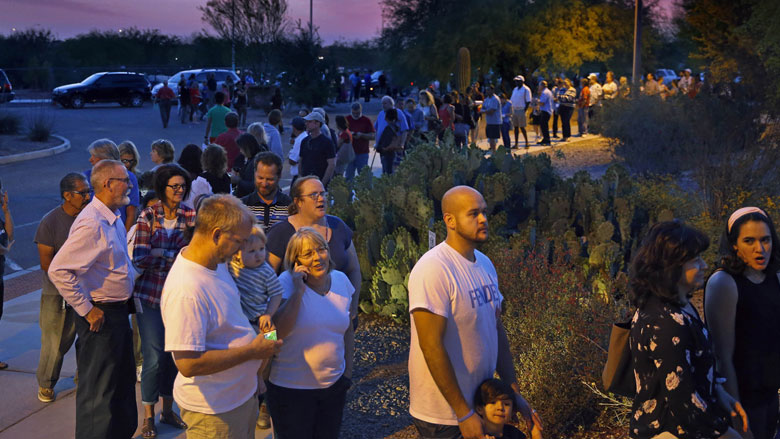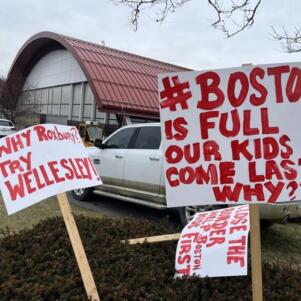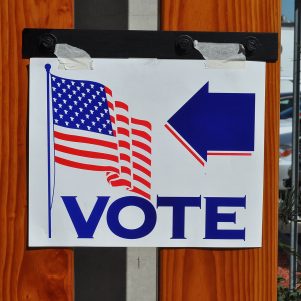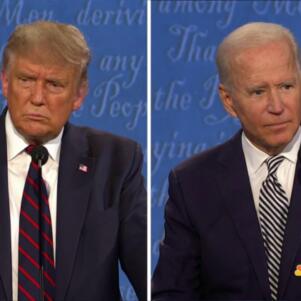Pizza and long lines: Arizona voters waited into wee hours
By Associated Press | April 5, 2016, 6:33 EDT
 People wait in line to vote in the primary Tuesday, March 22, 2016, in Chandler, Ariz. A document obtained from the Maricopa County Recorder’s Office shows that five polling places in metro Phoenix still had voters in line after midnight during Arizona’s botched presidential primary two weeks ago, including one location where the final ballot was cast at nearly 1 a.m., according to county records. (David Kadlubowski/The Arizona Republic via AP)
People wait in line to vote in the primary Tuesday, March 22, 2016, in Chandler, Ariz. A document obtained from the Maricopa County Recorder’s Office shows that five polling places in metro Phoenix still had voters in line after midnight during Arizona’s botched presidential primary two weeks ago, including one location where the final ballot was cast at nearly 1 a.m., according to county records. (David Kadlubowski/The Arizona Republic via AP) PHOENIX (AP) — Gustavo Mendez waited four hours to vote in Arizona’s presidential primary, marking his ballot just as poll workers brought out food for people stuck in line way past dark.
The 25-year-old looked forward to voting for Sen. Bernie Sanders, bringing his former girlfriend, who carried their young daughter, and a friend to line up at a west Phoenix church around 6 p.m. March 22.
After two hours, his fussy daughter and her mother had to leave. Mendez didn’t vote for until just after 10 p.m.
“That’s when they came in with food for people still there,” said Mendez, who saw pizza boxes coming out as he made his exit. “We didn’t expect it to take four hours.”
His wait wasn’t the longest. Some voters were forced to linger until 1 a.m. because of a steep cutback in polling places.
The Associated Press obtained a document from the Maricopa County Recorder’s Office that shows the time each of the 60 polling sites closed, providing a more complete picture of the painstaking lines voters experienced outside churches, recreation centers and other locations.
Maricopa County, with its 2 million registered voters, had 200 polling places in the 2012 presidential primary and 400 in 2008.
The last polling place closed at 12:58 a.m., meaning the final voters had to wait nearly six hours. The polls officially closed at 7 p.m., but anyone in line at that point was allowed vote. It was one of five places that stayed open past midnight. In all, people were still voting at 10 p.m. or later at 20 out of 60 locations in the county.
The document is among those the U.S. Justice Department is seeking as it investigates a complaint by the Phoenix mayor that the election disproportionately affected minority voters.
A letter from the department released Monday by the recorder’s office asked for information on 10 specific items, including a description of how election officials determined how many polling places were needed and whether potential effects on minority voters were examined.
The department declined further comment on its inquiry.
The frustrating waits come after the Arizona Legislature slashed funding last year for counties to carry out the presidential election. Election officials in Phoenix responded with scaled-back polling, citing a lack of money and the belief that people would vote by mail.
Despite the investigation, Arizona Secretary of State Michele Reagan on Monday certified results of the presidential primary, which Donald Trump and Hillary Clinton won.
As the state’s top election official, Reagan didn’t have the ability to reject the official canvass from the 15 counties, despite acknowledging problems that led some voters to be incorrectly left off rolls. The certification does, however, clear the way for any possible court challenges.
Reagan said her office and the Legislature may consider proposed changes in the way counties run future elections. Such changes previously required federal approval, but a 2013 U.S. Supreme Court decision threw out that portion of the Voting Rights Act.
Reagan has sidestepped questions about why she didn’t review the changes in the presidential primary herself in the absence of federal oversight since the other parts of the law remain in force.
Her certification of the results opens a five-day window for a challenge, something an attorney for Sanders is considering. Attorney Chris Sautter said last week that there was evidence an unknown number of voters had their ballots thrown out because of problems with voter rolls.
“What’s at stake are delegates,” Sautter said. “Obviously, the outcome of the election for the primary is not going to be changed, but delegate counts could be changed.”
Sanders lost to Hillary Clinton, but because Democrats allow delegates to their national convention proportionally, challenging the results could add to Sanders’ numbers. The state has 10 superdelegates and 75 at-large allocated in the primary.
Sautter is a veteran election attorney who was in Florida throughout the 2000 presidential fiasco, saying the Arizona “election is pretty close to as bad as that one.”











